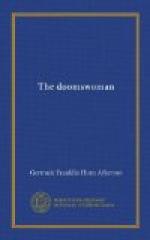“I shall not!” I exclaimed. “It is understood that when Dona Trinidad stays at home Chonita is in my charge. I will not permit such a thing.”
“Thou wilt, my Eustaquia. Dona Chonita is no pudding-brained girl. She needs no duena.”
“I know that; but it is not that I am thinking of. Suppose some one sees you; thou knowest the inflexibility of our conventions.”
“You forget that we are comadre and compadre. Our privileges are many.” He abruptly dismissed the intimate “thou,” with his usual American perversity.
“True; I had forgotten. But whither is all this tending, Diego? She neither will nor can marry you.”
“She both can and will. Will you help me, or not? Because if not I shall proceed without you. Only you can make it easier.”
I always gave way to him; everybody did.
He was as good as his word. How he managed, Chonita never knew, but not a half-hour after dinner she found herself alone in the canon with him, seated among the huge stones cataclysms had hurled there.
“Why have you brought me here?” she asked.
“To talk with you.”
“But this would be severely censured.”
“Do you care?”
“No.”
She looked at him with a curious feeling she had had before; there was something inside of his head that she wanted to get at,—something that baffled and teased and allured her. She wanted to understand him, and she was oppressed by the weight of her ignorance; she had no key to unlock a man like that. With one of her swift impulses she told him of what she was thinking.
He smiled, his eyes lighting. “I am more than willing you should know all that you would be curious about,” he said. “Ask me a hundred questions; I will answer them.”
She meditated a moment. She never had taken sufficient interest in a man before to desire to fathom him, and the arts of the Californian belle were not those of the tactfully and impartially interested woman of to-day. She did not know how to begin.
“What have you read?” she asked, at length.
He gave her some account of his library,—a large one,—and mentioned many books of many nations, of which she had never heard.
“You have read all those books?”
“There are many long winter nights and days in the redwood forests of the northern coast.”
“That does not tell me much,—what you have read. I feel that it is but one of the many items which went to the making up of you. You have traveled everywhere, no? Was it like living over again the books of travel?”
“Not in the least. Each man travels for himself.”
“Madame de Stael said that traveling was sad. Is it so?”
“To the lover of history it is like food without salt: imagination has painted an historical city with the panorama of a great time; it has been to us a stage for great events. We find it a stage with familiar paraphernalia, and actors as commonplace as ourselves.”




